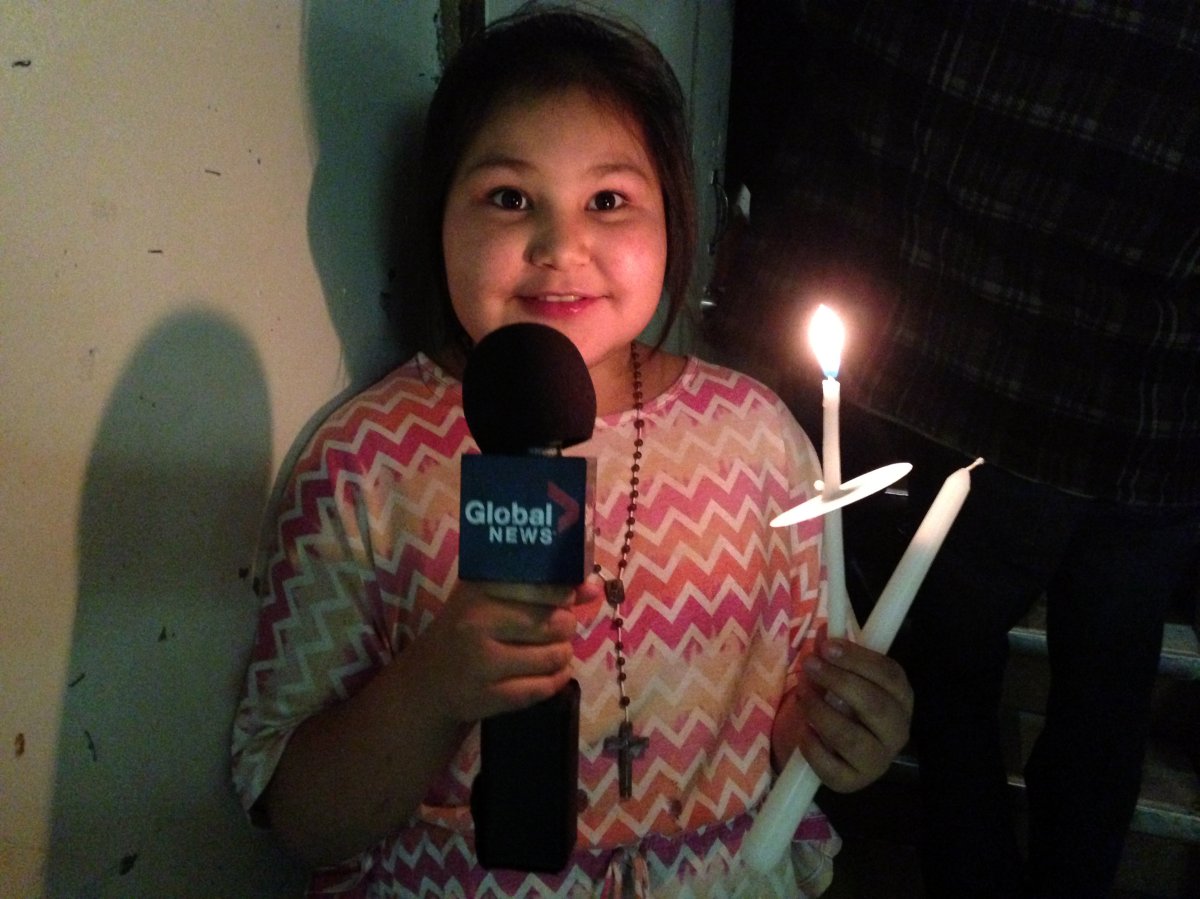LA LOCHE, Sask. – “Are you mean?” asked Kiandra Janvier, a Grade 4 student at La Loche Community School.

Kiandra and I met at the local arena on Sunday afternoon. She and her family came to a healing circle held by health counsellors in town. It was an opportunity for residents to share their perspectives on the tragic event and hear everyone else’s in an effort to move on, and deal with the raw emotion. Surprisingly, our cameras are allowed in. The organizer said she wouldn’t mind having us come and hear the stories as long as we were polite, respectful and would leave at a moment’s notice if asked.
Kiandra’s mother is nearby. I ask her if it’s ok to interview Kiandra on camera, and ask her about her experience on Friday. She declines the camera interview, but keeps chatting with us politely and I continue to take notes. That’s when Kiandra chimed in.
I blinked. “I don’t think I’m mean. Do you think I’m mean?” I asked, nervously.
“People are saying you’re mean,” she said.
A few moments of silence went by. That seems to be normal in Dene conversation. The people in this region don’t seem to mind long breaks in dialogue.
“Why are people saying you’re mean?” Kiandra asks.
I take a breath.
- Life in the forest: How Stanley Park’s longest resident survived a changing landscape
- Bird flu risk to humans an ‘enormous concern,’ WHO says. Here’s what to know
- Roll Up To Win? Tim Hortons says $55K boat win email was ‘human error’
- Election interference worse than government admits, rights coalition says
“Reporters have to tell people’s stories,” I said. “Because they don’t want the same things to happen again, and again.”
Another break. I can’t stand this one.
“What kinds of things do you like to do in La Loche?” I ask, trying to change the subject.
Kiandra goes on to tell me that she likes to skate, that she plays minor hockey, and she really loves her teammates.
“The community has a strong minor hockey program,” said Leonard Montgrand, the executive director for the La Loche Friendship Centre.
“We were supposed to have a tournament this week, but we’ve cancelled,” he said. “And now, people are calling me and saying, ‘Well, we don’t want to go to La Loche.’ That makes no sense. If it happened in Regina you wouldn’t stop going to Regina. If it happened in Saskatoon you wouldn’t stop going to Saskatoon.”
Kiandra tells me La Loche is sometimes boring.
“I used to think that about where I was from too,” I said. “What kinds of things would you like in La Loche?”
“Toys”R”Us!” she responds enthusiastically, and I laugh at her bright smile. “Aaaand.. McDonalds.”
“Have you been to those stores?”
“In Saskatoon,” she said.
Saskatoon is 604 kilometres away, but she’s been there a few times.
Most residents here seem to have paid at least one visit to “Saskabush” as it’s locally known, but few have traveled as far south as Regina, 872 km away.
La Loche’s sheer geographical distance from major centres presents huge challenges.
Eight months ago, a grocery store opened in town, a sign of development and, in turn, hope for the community. Prior to its opening, the closest store was in Buffalo Narrows, 101 kilometres down a gravel highway.
There are no hotels, and no rental accommodations to speak of. This means professionals coming into town like doctors, nurses, and teachers find it nearly impossible to live there and be part of the community.
“We lack a lot of the basic necessities in our community,” said Montgrand. “The town has worked hard to bring new houses to our community so people can live here and enjoy life, but..” he trails off.
Local sources, who declined to be named because of their position in the community, say retaining staff is a major issue. Residents looking for help with addictions, for example, will see a worker for only a few months before they quit or move.
“They don’t get to know you, and it slows the whole process of working your problems out down, or it stalls it all together,” they said.
That’s coupled with chronic under-staffing in the community.
“We’re tired,” said Montgrand. “We need people to come in the community and help for the long-term.”
I saw Kiandra and her mother again later that night at a candlelight vigil. Kiandra says hello and comes up to me like we’re old pals. She asks if she can hold the microphone. She wants to give me an interview, but I say it’s still up to her mother.
She goes to ask again and her mother nods approvingly at me. We do a short interview, and she tells me about her experience inside the community school during the lock-down.
“We had to sit on the floor and everything like that, and we had to play quiet games,” she said. “Everyone is feeling sad. And the parents are really really sad.”
We turn off the camera and go back to chatting.
“Will you be my friend?” asks Kiandra.
“Of course,” I said.
“Are you going to go away? All my friends go far away,” she asked.
Deep breath. “Yes, I’m leaving in two days.”
Long pause.
My camera man comes back from shooting some b-roll, and it’s time for us to go.
“Will I see you again?”
“I hope so,” I say. I give her a big hug.
I’ve left town but I’ll never forget Kiandra, and I hope the rest of Saskatchewan, and Canada doesn’t either.




Comments